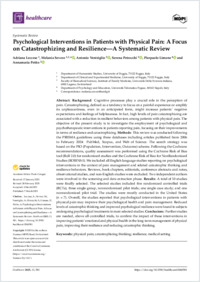Psychological interventions, resilience, and catastrophizing in patients with physical pain : a systematic review
- Leccese, Adriana Department of Humanistic Studies, University of Foggia, Italy
- Severo, Melania Department of Humanistic Studies, University of Foggia, Italy - Department of Clinical and Experimental Medicine, University of Foggia, Italy
- Ventriglio, Antonio Department of Clinical and Experimental Medicine, University of Foggia, Italy
- Petrocchi, Serena ORCID Faculty of Biomedical Sciences, Università della Svizzera italiana, Switzerland
- Limone, Pierpaolo Department of Psychology and Education, Università Telematica Pegaso, Napoli, Italy
- Petito, Annamaria Department of Clinical and Experimental Medicine, University of Foggia, Italy
- 2025
Published in:
- Healthcare. - 2025, vol. 13, no. 6, p. 581
English
Cognitive processes play a crucial role in the perception of pain. Catastrophizing, defined as a tendency to focus on a painful experience or amplify its unpleasantness, even in an anticipated form, might increase patients’ negative expectations and feelings of helplessness. In fact, high levels of pain catastrophizing are associated with a reduction in resilient behaviors among patients with physical pain. The objective of the present study is to investigate the employment of psychological and psychotherapeutic interventions in patients reporting pain, focusing on their improvements in terms of resilience and catastrophizing. Methods: This review was conducted following the PRISMA guidelines using three databases including articles published from 2006 to February 2024: PubMed, Scopus, and Web of Science. The search strategy was based on the PIO (Population, Intervention, Outcome) scheme. Following the Cochrane recommendations, quality assessment was performed using the Cochrane Risk of Bias tool (RoB 2.0) for randomized studies and the Cochrane Risk of Bias for NonRandomized Studies (ROBINS-I). We included all English language studies reporting on psychological interventions in the context of pain management and related catastrophic thinking and resilience behaviors. Reviews, book chapters, editorials, conference abstracts and notes, observational studies, and non-English studies were excluded. Two independent authors were involved in the screening and data extraction phase. Results: A total of 10 studies were finally selected. The selected studies included five randomized controlled trials (RCTs); three single group, nonrandomized pilot trials; one single case study; and one nonrandomized pilot trial. The studies were mostly conducted in the United States (n = 7). Overall, the studies reported that psychological interventions in patients with physical pain may improve their psychological health and pain management. Reduced levels of catastrophic thinking and improved psychological resilience were found in subjects undergoing psychological treatments in most selected studies. Conclusions: Further studies are needed, above all controlled trials, to confirm the impact of these interventions in improving patients’ emotional and physical health in the long-term management of physical pain, improving their resilience and reducing catastrophic thinking.
- Collections
- Language
-
- English
- Classification
- Medicine
- License
- Open access status
- gold
- Identifiers
-
- DOI 10.3390/healthcare13060581
- ARK ark:/12658/srd1332037
- Persistent URL
- https://n2t.net/ark:/12658/srd1332037
Statistics
Document views: 206
File downloads:
- Petrocchi_2025_MDPI_healthcare_Psychological Interventions: 32
